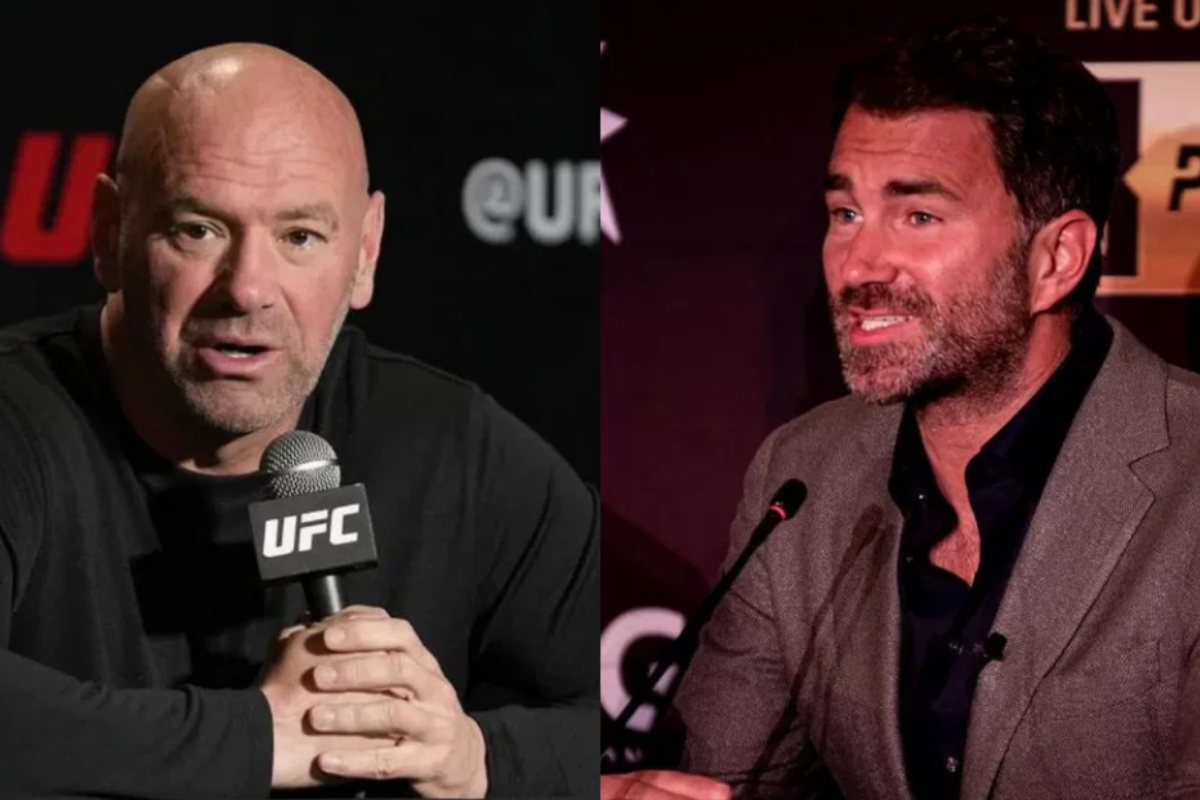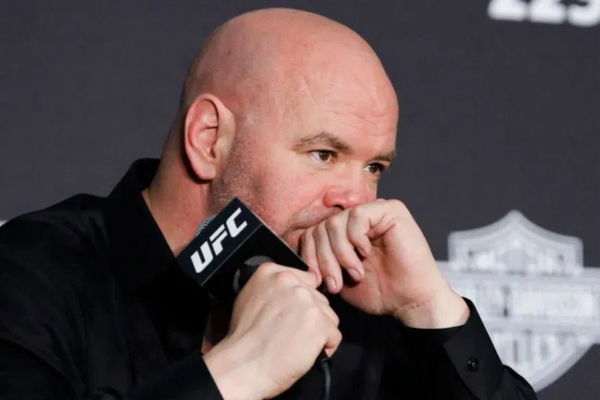
Imago
via IMAGO

Imago
via IMAGO
Dana White has long been a pivotal figure in combat sports, driving the global rise of MMA through the UFC. But it wasn’t always that way as boxing once dominated the landscape, especially in the early days of the UFC. White, however, saw the cracks forming in boxing and believed its decline could pave the way for MMA’s growth. In an interview with Grant Cardone, he broke down his perspective on how the sport lost its grip.
Watch What’s Trending Now!
Reflecting back two years ago on the state of boxing in 1989, White said, “Boxing was huge. Boxing was as big as it had ever been in the late 80s and early 90s.” But he also noted, “I saw it started to fall apart at the amateur level… All the big amateur box-offs were on NBC. NBC had just gotten rid of them… The last guy to fight on NBC was Floyd Mayweather.” At the same time, he added, “I came from the mean streets of such-and-such… and if it weren’t for boxing, I’d be in jail.” To White, the issue wasn’t boxing itself but the way it was being managed. He argues that mismanagement, and stagnant business models have hollowed out what once was the king of combat sports. And now, two UFC veterans are weighing in on whether White’s assessment of the sport is right or wrong.
ADVERTISEMENT
Can Dana White fix boxing’s hidden flaws?
Dana White is putting his money where his mouth is, launching Zuffa Boxing under the TKO umbrella to force change.
ADVERTISEMENT
Josh Thomson and John McCarthy recently broke down the growing tension between Dana White and Eddie Hearn on their Weighing In YouTube channel, and both had strong opinions on where boxing stands today. Thomson, looking at the sport’s centuries-old history, noted that hardcore boxing fans struggle to let go of what it once was. “For all the hardcore boxing fans, it’s going to be hard to let go of what it was. But the thing is, it’s not working,” he said. He argued that boxing’s decline has been visible for years, adding, “We’ve been talking about it for over 15 years, John. Maybe even longer.” In his eyes, the sport’s traditional model is broken, and trying something new, like Dana White’s vision for Zuffa Boxing, might be the only way forward.
Thomson also dismissed critics who complain about the UFC CEO’s push to reshape boxing. He pointed out that the people raising concerns aren’t the ones taking the financial risk. “It ain’t your money that people are spending to try and do it,” he said. In other words, fans and media don’t have to deal with the millions being invested, so their backlash doesn’t hold much weight. His stance reflects a simple truth: innovation often comes from those willing to take risks, and if White is willing to put up the money, why not see where it goes?
ADVERTISEMENT

ADVERTISEMENT
John McCarthy built on that thought by identifying fear of change as boxing’s biggest obstacle. “For the most part, people fear change. It’s the unknown and they fear it,” he explained. He challenged boxing’s defenders to ask themselves why they resist something that could potentially save the sport. And boxing, with its history of disorganization, pay disputes, and fragmented promotions, has plenty of room for improvement if a bold plan like Zuffa Boxing takes off.
On the other hand, Josh Thomson, drawing from his own experience, the Bellator champion shared that he once sacrificed personal earnings for the greater good of MMA’s growth. “I took less money when I shouldn’t have, for the greater group of the sport,” the 46-year-old admitted, further scoring, “If you want the lower guys to start getting the recognition and making enough to survive and not just getting punched drunk fighting fu–s for $600 a round, this needs to happen.”
ADVERTISEMENT
Ultimately, both Josh Thomson and McCarthy agreed that change is not just an option, but a necessity for boxing’s survival. As McCarthy put it, reform could mean that even fighters who never become world champions might still earn enough to buy homes, support their families, and send their kids to school.
For Dana White, Zuffa Boxing isn’t just another business venture, it’s being framed as a lifeline for a sport in dire need of restructuring. If successful, the impact could rival the UFC’s explosive rise in the early 2000s. White believes the key lies in uncovering talent that can capture global attention, and that’s exactly where he sees his role. In fact, he’s already laid the groundwork, assembling a 70-fighter roster to spearhead his bold boxing takeover.
ADVERTISEMENT
Dana White sets sights on boxing’s next superstars
Speaking with Vegas PBS, Dana White revealed that Zuffa Boxing is already well underway, with “between 60 and 70 fighters under contract.” However, the project still depends on the Muhammad Ali American Boxing Revival Act, which hasn’t yet passed in Congress. White explained that attracting fighters hasn’t been difficult because athletes now have many options, and he acknowledged his competition, saying, “Eddie Hearn is a great promoter… You got Frank Warren out in the UK, too… We’re all going to have to compete and we’re all going to try to be better than the other guy to get the best talent.”
ADVERTISEMENT
White also pushed back against the notion that boxing automatically guarantees big paychecks. While some stars earn millions, many fighters do not, meaning joining Zuffa Boxing “may not make much of a difference” unless they’re offered significant payouts. He emphasized that his real competition isn’t just other promoters but entertainment in general: “I compete with the NFL, I compete with the NBA, I compete with big movie studios. Whatever takes your attention on Saturday night is my competition.”
Looking ahead, Dana White admitted that boxing is a very different challenge compared to his decades in MMA. “It’s a totally different world than MMA,” he said, noting that his first year in the sport will test him against established promoters like Hearn and Warren. Even so, he is determined to shake up boxing the same way he transformed MMA.
If White succeeds, the shift may also change fighter compensation models globally, especially for undercards and mid-tier fighters who now often toil without visibility or guarantees. Already, White is suggesting “big announcements” in boxing for 2026, indicating increased frequency for events and more structured promotion schedules.
ADVERTISEMENT
That said, do you think Dana White can do that?
ADVERTISEMENT
ADVERTISEMENT
ADVERTISEMENT